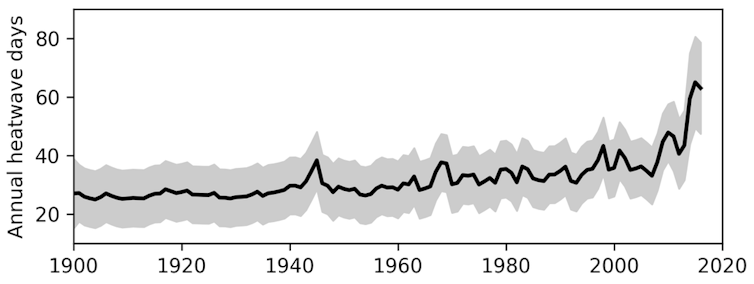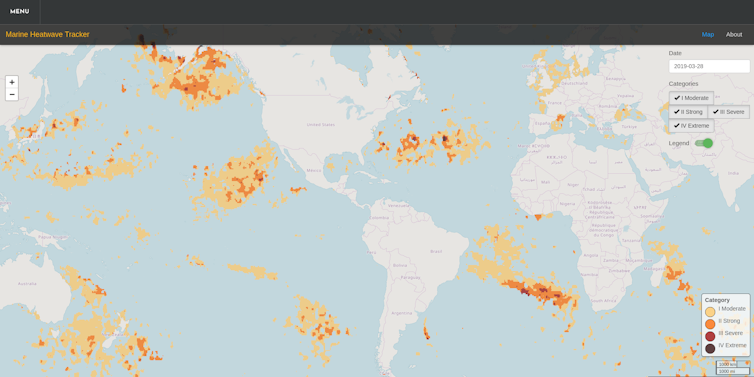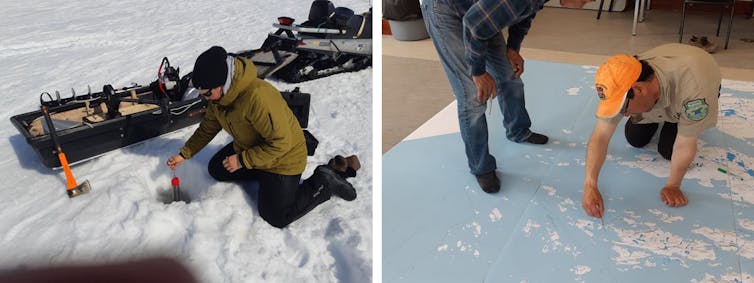Author is an Assistant Professor of Physical Oceanography at »ĆÉ«Ö±˛Ą.
Climate change has made , both on land and beneath the ocean’s surface. As the world’s ocean sucks up carbon dioxide from the atmosphere — as well as — it is undergoing some significant changes.
— prolonged periods of unusually warm ocean temperatures — are one of those changes. These extreme temperatures are increasing in frequency around the globe and .

As an oceanographer, — from week-to-week, year-to-year and, of course, over decades and centuries — to better understand the changes that are underway and the far-reaching impacts they may have on marine ecosystems and the communities that rely on them.
Personal connections
I’m of mixed settler and Indigenous descent. On one side, my roots are in the Inuit of northern Labrador, and as Inuit our relationship with the ocean is of paramount importance. The ocean provides our food, our highways and our connection to nature.
Over the past 40 years, September Arctic sea ice extent has fallen by about half, and this year it is . For Labrador Inuit, this means the ice is becoming less predictable. What would a spring without sea ice look like? What would it mean?
It would mean being unable to travel across the sea ice. It would mean being unable to access wild foods, like seals, and being more reliant on over-priced and under-nourishing “store food.” It would mean an inability to reach culturally important places that lie far from communities. It would mean a significant change in lifestyle — and one that I would describe as .
Read more:
On the other side, I’m linked to settlers and immigrants to Nova Scotia’s South Shore, a place economically and culturally linked to the sea. What do warmer water temperatures — — mean for coastal fishers?
It would mean an uncertain future to say the least. Will the fisheries that support communities there, like the American lobster or the snow crab, remain viable in the decades to come? The answer to that is not clear. Is there a fishery that might replace these in a drastically warmer future climate? We don’t yet know.
Ocean temperature extremes
Marine heatwaves occur in different places at different times, yet can have dramatic impacts on marine ecology and fisheries. They can occur at any time of year, yet often have the greatest impacts during the already-warm summer season.

For example, raised ocean temperatures 1-3C above the 1981-2011 average. The warmer waters pushed American lobsters to move into shallower coastal areas in greater numbers and earlier than usual in the Gulf of Maine. This had economic implications for fishers as lobster prices dropped, and increased political tensions between the United States and Canada.
The scientific understanding of marine heatwaves is still at the early stages. We have a lot of work ahead of us to understand their . This information can help us understand the , as well as which regions may be able to forecast high-impact and their potential risks to marine fisheries and ecosystems.
Working towards the future
My team at »ĆÉ«Ö±˛Ą, which includes graduate students and postdoctoral fellows, is tackling a number of questions on this front. We are looking into the historical record of marine heatwaves in the Scotian Shelf (southwest of Nova Scotia) to better understand how past temperature swings are linked with historic fisheries there. We are digging deeper into the physical processes and statistical properties underlying marine heatwaves so that they may be better predicted. And we are working on computer simulations of the ocean so that we can investigate past and future scenarios. We also hope to bridge the gaps between climate science and the fishing industries, and between basic research and practical applications.
Finally, I see a need to mobilize knowledge between scientists and communities — in both directions. Local people are part of the solution. They can be involved in identifying the research questions for scientists to study and evaluate proposed fixes. , and have had success in the past in getting community members and coastal fishers involved in making measurements of the ocean and working directly with ocean scientists.
I have launched to make this link in my home region of northern Labrador, including community-based monitoring of ocean temperatures from the sea ice, deploying ocean drifters along the coast and documenting local ocean knowledge in order to integrate it alongside scientific measurements.

The world’s ocean is changing. As scientists we can focus our research on trying to understand and solve the problems of ocean change. As people and communities, we can provide knowledge and guidance to the scientific community on those problems of greatest concern — and help solve them together.
which features includes relevant and informed articles written by researchers and academics in their areas of expertise and edited by experienced journalists.
»ĆÉ«Ö±˛Ą is a founding partner of The Conversation Canada, an online media outlet providing independent, high-quality explanatory journalism. Originally established in Australia in 2011, it has had more than 85 commissioning editors and 30,000-plus academics register as contributors. A full list of articles written by »ĆÉ«Ö±˛Ą academics can be found onÂ

